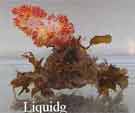Phosphate precipitation to calcium-phosphate in the reef aquarium.
South East Queensland Marine Aquarium and Ocean activities Forum :: SEQMAOAF :: Advice on all marine aquarium issues
Page 1 of 1
 Phosphate precipitation to calcium-phosphate in the reef aquarium.
Phosphate precipitation to calcium-phosphate in the reef aquarium.
This trial was applied over a four-week period.
The conditions-parameters in my case to precipitate phosphates into a solid with calcium are as follows.
KH-above 15
PH-above 8.6
Temp-18c to no greater then 25c
Cal-Above 700
Phosphate was at zero with in several days once these parameters were applied and held at those levels.
The photos that follow are some of the phos-cal precipitation on the aquarium walls that algae have begun to grow on.




Some of the cal-phos scraped off that still has some colour with in.

Some cal-phos that has been dried and cleaned of any algae.

When this was crushed and sat in a cup of RO water with salt to normal salinity after initially testing zero phos, after four days the test that was applied showed phos levels near the max of the tests capacity.
This is a pic of extreme calcium precipitation at the same time.
This was achieved from none to this in the same length of time.

The draw backs to this experiment were extensive and made the use of phos-cal precipitation useless.
Algae suffering and virtually dissolved.


Mermaids tail lost all of its algae.

This un named algae began to desolve.

This green acan began changing to orange.

A coralline section that grew in that time and above the cal-phos sections can be seen.

This sps encrusting type of coral thrived in the test conditions.

This one and several other purple sps suffered greatly during this test.

This sps began growing abnormally during these conditions.

Over all this way to remove phosphates is useless unless you are prepared to loose life forms.
The conditions-parameters in my case to precipitate phosphates into a solid with calcium are as follows.
KH-above 15
PH-above 8.6
Temp-18c to no greater then 25c
Cal-Above 700
Phosphate was at zero with in several days once these parameters were applied and held at those levels.
The photos that follow are some of the phos-cal precipitation on the aquarium walls that algae have begun to grow on.




Some of the cal-phos scraped off that still has some colour with in.

Some cal-phos that has been dried and cleaned of any algae.

When this was crushed and sat in a cup of RO water with salt to normal salinity after initially testing zero phos, after four days the test that was applied showed phos levels near the max of the tests capacity.
This is a pic of extreme calcium precipitation at the same time.
This was achieved from none to this in the same length of time.

The draw backs to this experiment were extensive and made the use of phos-cal precipitation useless.
Algae suffering and virtually dissolved.


Mermaids tail lost all of its algae.

This un named algae began to desolve.

This green acan began changing to orange.

A coralline section that grew in that time and above the cal-phos sections can be seen.

This sps encrusting type of coral thrived in the test conditions.

This one and several other purple sps suffered greatly during this test.

This sps began growing abnormally during these conditions.

Over all this way to remove phosphates is useless unless you are prepared to loose life forms.
_________________
Forum Admin

liquidg- Posts : 2782
Join date : 2010-02-02
Location : Brisbane bayside
 Similar topics
Similar topics» Calcium levels in marine aquarium seem too high, for no obvious reason!
» Phosphate,what is it,how to get rid of it and what does it mean to a marine aquarium?
» Phosphate and algae.
» Heaters used in a reef aquarium.
» Reef life that changes their habits once in the reef aquarium.
» Phosphate,what is it,how to get rid of it and what does it mean to a marine aquarium?
» Phosphate and algae.
» Heaters used in a reef aquarium.
» Reef life that changes their habits once in the reef aquarium.
South East Queensland Marine Aquarium and Ocean activities Forum :: SEQMAOAF :: Advice on all marine aquarium issues
Page 1 of 1
Permissions in this forum:
You cannot reply to topics in this forum
 Home
Home